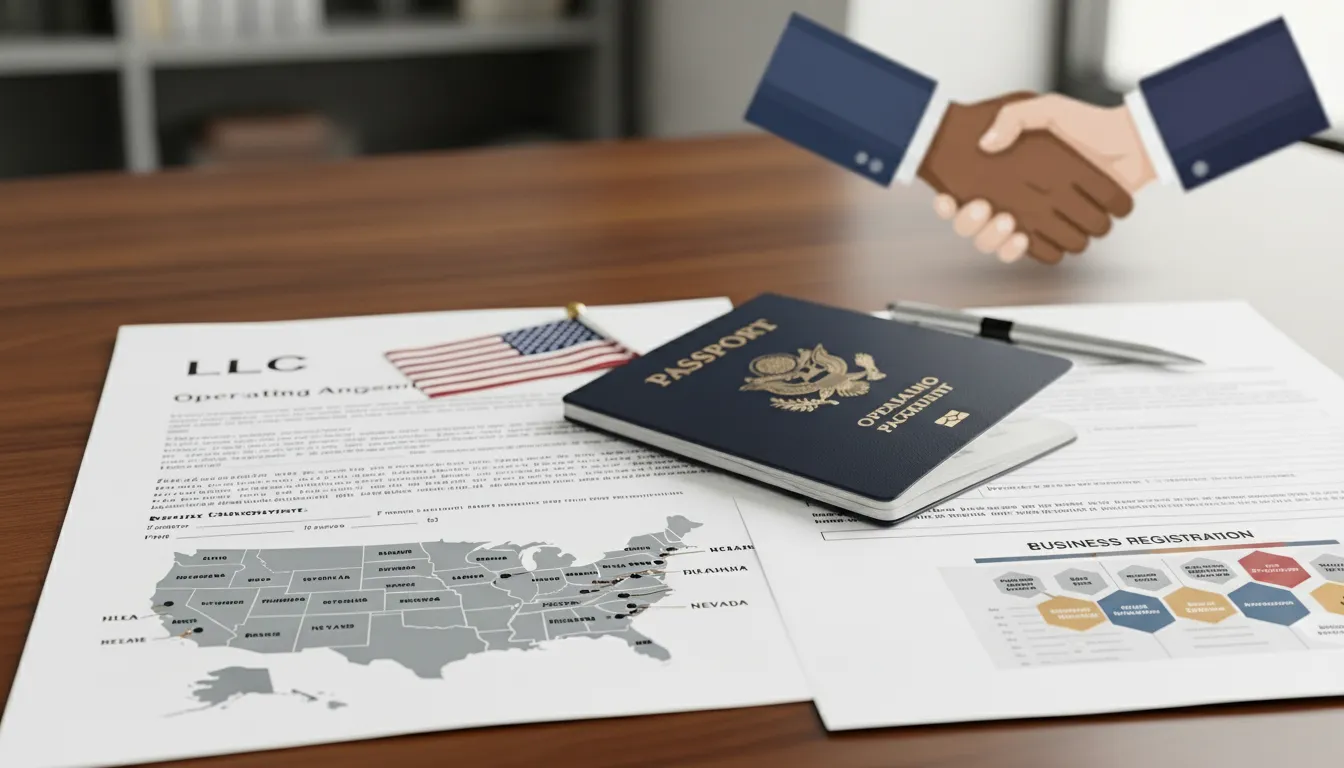The United States remains one of the most sought-after destinations for entrepreneurs worldwide, thanks to its large consumer market, strong economy, and stable legal system. With over 330 million potential customers and access to global trade networks, it offers unmatched opportunities for scaling a business.
For foreign owners, forming a Limited Liability Company (LLC) provides a winning combination of personal liability protection, enhanced credibility with clients and partners, and flexible tax options that can be tailored to their situation. An LLC also allows non-US citizens to operate with fewer restrictions compared to other business structures.
Many international entrepreneurs use US LLCs to run e-commerce stores, consulting businesses, real estate investments, and technology startups, taking advantage of the country’s infrastructure, payment systems, and investor confidence.
Can a Foreigner Own an LLC in the USA?
Yes, there’s no citizenship or residency requirement to form and own a US LLC. Entrepreneurs from almost any country can start and manage one, whether they live in the United States or abroad.
Who can and cannot own or manage a US LLC: Almost anyone can be a member (owner) or manager of an LLC. The few restrictions typically relate to individuals or entities from countries subject to US trade sanctions.
Owning vs. working in the US: It’s important to note that owning an LLC doesn’t give you the legal right to work or live in the United States. If you plan to be physically present and work for your LLC in the US, you may need the appropriate visa or work authorization.
Key Benefits of Forming a US LLC as a Foreigner
Forming a US LLC as a foreign entrepreneur offers more than just a prestigious business address. It opens the door to legal protections, flexible operations, and direct access to one of the world’s largest markets.
- Limited liability protection for personal assets: Your personal property, like your home, savings, and car, is kept separate from your business debts and legal obligations. This helps shield you from financial risk.
- Flexible management and profit distribution: An LLC allows owners to manage the business themselves or appoint managers. Profits can be divided in any way the members agree upon, not strictly by ownership percentage.
- Access to US customers, payment systems, and banking: Having a US-based business makes it easier to work with American clients, accept payments through US processors such as Stripe and PayPal, and open a US bank account.
- Potential tax advantages depending on structure and treaties: With the right setup, and depending on your country’s tax treaty with the US, you may reduce your overall tax burden while staying compliant with both US and home-country laws.
Things to Know Before You Start
Before forming a US LLC as a foreign entrepreneur, it’s crucial to understand the rules, costs, and tax implications you may face.
- Understand US Tax Obligations: Foreign-owned LLCs have unique IRS filing requirements, such as Form 5472, annual reports, and possibly federal income tax if you have US-sourced income. Some states also impose separate taxes and fees.
- US Mailing Address or Registered Agent: To receive legal documents and official government correspondence, you must have a physical US address, typically through a registered agent or a mail forwarding service.
- Double Taxation Risks: Without proper planning, profits may be taxed both in the US and your home country. International tax treaties can help reduce or eliminate double taxation, but you need to verify your country’s agreement with the US.
- Entity Tax Elections: Understand the differences between default pass-through taxation, electing to be taxed as a C corporation, and why the S corporation election isn’t available for non-resident aliens. The choice impacts your tax rate, deductions, and filing complexity.
Step-by-Step Process to Start an LLC as a Foreigner
Starting a US LLC as a non-resident may feel like navigating a maze, but breaking it down into clear steps makes it manageable. Each stage is crucial for maintaining compliance and ensuring your business is legally prepared to operate.
1. Choose a State
Your choice of state impacts taxes, privacy, annual fees, and ease of doing business. Popular options include:
- Delaware – Strong corporate laws, investor-friendly, no state tax for out-of-state income.
- Wyoming – No personal or corporate income tax, strong privacy, low fees.
- Florida – No personal income tax, great for real estate and service-based businesses. (Note that while a new law was passed in 2025 to allow for Series LLCs, that option won’t be available until the law takes effect on July 1, 2026.)
- Texas – Large market, no personal income tax, relatively low franchise tax.
- Nevada – Strong privacy and asset protection, no corporate income tax.
If most of your customers are in one state, consider forming your LLC there to avoid foreign registration costs.
2. Name Your LLC
Follow your chosen state’s naming rules, which usually require:
- Including “LLC” or “Limited Liability Company” in the name.
- Avoid using restricted words like “bank” or “insurance” unless licensed.
- Checking that the name is unique in your state’s business registry.
You should also search the USPTO trademark database to avoid legal conflicts.
3. Appoint a Registered Agent
Every US LLC must have a registered agent with a physical address in the state of formation. This person or service receives legal and tax documents on behalf of your LLC. For foreigners, hiring a professional registered agent service is the easiest option.
4. File Articles of Organization
This official document creates your LLC. It typically includes:
- Business name and address.
- Registered agent’s name and address.
- Names of members or managers (in some states).
- Filing fees range from $50 to $500, depending on the state.
5. Get an EIN (Employer Identification Number)
An EIN is like a Social Security Number for your business, required for opening bank accounts, paying taxes, and hiring employees. Foreigners can get an EIN by:
- Completing IRS Form SS-4.
- Mailing or faxing it to the IRS.
- Applying without a Social Security Number by leaving that field blank and writing “Foreign.”
6. Create an Operating Agreement
Even if your state doesn’t require it, an operating agreement outlines:
- Ownership percentages.
- Profit-sharing rules.
- Management structure.
It helps avoid disputes and provides proof of ownership for banks and investors.
7. Open a US Business Bank Account
Many US banks require in-person visits, which may mean traveling to the US. Alternatives include online banking options and fintech platforms like Mercury or Wise that accept foreign owners.
8. Apply for Necessary Licenses & Permits
Your industry and location may require extra licensing, such as:
- Seller’s permits for retail businesses.
- Professional licenses for regulated industries.
- Zoning permits for physical locations.
9. Register for Taxes
Depending on your business activities and state, you may need to:
- Register for state sales tax.
- Pay annual franchise or business taxes.
- File federal income tax returns for US-sourced income.
| Step | Action | Key Points |
| 1 | Choose a State | Consider taxes, fees, privacy, and market access. Popular choices: Delaware, Wyoming, Florida, Texas, Nevada. |
| 2 | Name Your LLC | Follow state naming rules, check availability, and search trademarks to avoid legal issues. |
| 3 | Appoint a Registered Agent | Required for all LLCs. Must have a physical address in the state. Can be a service or an individual. |
| 4 | File Articles of Organization | Submit to the state with LLC name, address, registered agent info, and management structure. |
| 5 | Get an EIN | Apply via IRS Form SS-4. Foreigners can apply without an SSN by mailing or faxing the form. |
| 6 | Create an Operating Agreement | Outlines ownership, management, and profit distribution. Not always required, but highly recommended. |
| 7 | Open a US Business Bank Account | May require an in-person visit; some fintech banks offer remote options. |
| 8 | Apply for Licenses & Permits | Meet industry-specific, federal, state, and local requirements. |
| 9 | Register for Taxes | Fulfill federal, state, and local tax obligations, including sales tax if applicable. |
Banking for Foreign-Owned LLCs
Opening a US business bank account as a foreign-owned LLC can be one of the trickiest steps in the process. Most traditional US banks have strict identification and compliance requirements, which can create challenges if you don’t have US residency or a Social Security Number (SSN).
Challenges
- Proof of identity – Many banks require in-person verification of the owners or managers.
- Address requirements – Some banks require a US mailing address or proof of a US-based business presence.
- Compliance checks – Banks must follow “Know Your Customer” (KYC) and anti-money laundering regulations, which can be more time-consuming for foreign owners.
Banks That Cater to Foreign Owners
- Bank of America, Wells Fargo, and Chase – Known to open accounts for foreigners, but typically require an in-person visit to a US branch.
- HSBC and Citibank – International banks that may allow you to open an account from abroad if you have an account in your home country.
Online Banking & Fintech Solutions
- Mercury – Popular for tech startups and e-commerce businesses; allows non-residents to open accounts remotely with proper documentation.
- Wise (formerly TransferWise) Business – Offers multi-currency accounts for receiving and sending payments internationally.
- Payoneer – Useful for global payments and receiving funds from marketplaces like Amazon or Fiverr.
Tip: If possible, plan a trip to the US after forming your LLC to open a traditional account, as this can give you more banking options and credibility.
Taxation for Foreign-Owned LLCs
Understanding how taxes work for a foreign-owned LLC is crucial to avoid penalties and maintain compliance with US tax laws.
How the IRS Taxes Foreign-Owned LLCs:
Single-Member LLCs (SMLLCs)
- Treated as “disregarded entities” for US tax purposes unless you elect to be taxed as a corporation.
- Must file Form 5472 and a pro forma Form 1120 each year to report transactions between the LLC and its foreign owner.
Multi-Member LLCs
- Treated as partnerships by default unless electing corporate taxation.
- Must file Form 1065 (partnership return) and issue Schedule K-1 to each member.
Federal and State Tax Filing Requirements
- Federal income tax obligations vary depending on whether the LLC has “effectively connected income” (ECI) in the US.
- State taxes depend on where your LLC operates or has a physical/economic presence.
- Even if no tax is owed, annual filings are typically required.
Withholding Taxes & Reporting Obligations
- Payments of US-sourced income to foreign owners may be subject to 30% withholding tax, unless reduced by a tax treaty.
- Certain payments (like interest, dividends, and royalties) also trigger withholding and reporting.
Role of Double Taxation Treaties
- The US has treaties with many countries that can reduce or eliminate withholding taxes.
- Treaties may also define how business profits are taxed between the US and your home country.
- Working with a cross-border tax professional can help you leverage treaty benefits.
Note: For tax purposes, you should consult the IRS information on Limited Liability Companies (LLC) to understand federal classifications and filing requirements for foreign-owned entities.
Visa and Immigration Considerations
When starting a US LLC as a foreigner, it’s important to separate business ownership from immigration status.
Owning an LLC vs. US Residency
- Simply owning a US LLC doesn’t give you US citizenship, residency, or a work visa.
- You can own and receive profits from your LLC without living in the US, but your activities may be limited if you’re physically present in the country.
Common Visa Paths for Entrepreneurs
- E-2 Treaty Investor Visa: Available to citizens of countries with an E-2 treaty with the US. Requires a substantial investment in a US business.
- L-1 Intracompany Transfer Visa: For business owners expanding a foreign company to a US branch or subsidiary.
- EB-5 Immigrant Investor Program: Grants a green card for significant investment ($800,000–$1,050,000) and job creation in the US.
Restrictions on Active Management:
- Without proper work authorization, you cannot engage in hands-on management or day-to-day operations while in the US.
- You may hire US-based employees or managers to run operations on your behalf.
Common Mistakes to Avoid
When forming a US LLC as a foreigner, avoid these costly pitfalls that can hurt your business in the long run:
- Choosing the Wrong State: Picking a state solely for tax savings without considering where you actually operate can lead to expensive foreign registration fees and extra compliance burdens.
- Failing to Maintain Compliance: Missing deadlines for annual reports, taxes, or business license renewals can result in penalties, suspension, or even dissolution of your LLC.
- Mixing Personal and Business Finances: Using the same bank account for personal and business expenses can weaken liability protection and create accounting/tax complications.
- Not Understanding US Tax Rules: Failing to research US and home country tax obligations (including treaties) can lead to double taxation and unexpected IRS filings.
FAQs About Starting a US LLC as a Foreigner
Starting a US LLC as a non-resident comes with unique questions. Below are some of the most common ones foreign entrepreneurs ask before launching:
1. Can I Start an LLC Without Visiting the US?
Yes. You can form an LLC remotely through a registered agent service. However, opening a US bank account may require an in-person visit, depending on the bank.
2. Can My Us LLC Open Accounts on Amazon or PayPal?
Yes. Both platforms allow foreign-owned US LLCs to register, provided you submit the necessary tax and business verification documents (EIN, formation documents, ID).
3. What Is the Cheapest State to Form an LLC?
Wyoming is often considered the most cost-effective, thanks to low filing fees, no state income tax, and strong privacy laws.
4. Do I Need a US Business Partner?
No. Foreigners can own 100% of a US LLC. A US-based partner may be helpful for certain operations, but it’s not legally required.
Final Takeaway
Forming a US LLC as a foreigner is a clear and achievable process when you plan. The most successful ventures strike the right balance between legal compliance, tax efficiency, and practical business operations.
By choosing the right state, understanding your tax obligations, and setting up the proper support systems, you can tap into the vast opportunities of the US market while protecting your assets and reputation.




